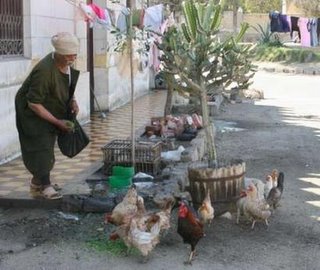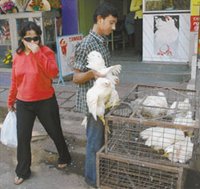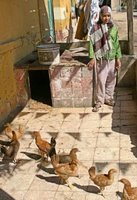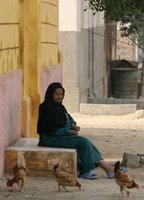Mass Slaughter, State of Emergency Declared Over Avian Flu Spread in Egypt
 On Thursday, first cases of Avian Flu were confirmed in Egypt in several governorates. The news came as a shock for me, knowing the style of life in Egypt and how so many densely populated areas in Egypt have direct interaction with birds and poultry in particular.
On Thursday, first cases of Avian Flu were confirmed in Egypt in several governorates. The news came as a shock for me, knowing the style of life in Egypt and how so many densely populated areas in Egypt have direct interaction with birds and poultry in particular.When I heard the news, my first response was talking to my mom and dad and seriously warning them against any contact with live birds and poultry. I am worried about my mom most. I had never seen in my entire life such a nature-loving person as my mom. She has always maintained a close connection with nature and I admire her so much for that in which I learned how to appreciate nature and never cause any damage or pain to small or big creatures no matter what. It is also hard to maintain this relationship with nature in such a crowded crazy city like Cairo. In a metropolitan city like Cairo where traces of natural environment have almost disappeared except for the Nile River. I sometimes wonder when the river will take a stance to stop running at least through Cairo for all forms of pollution that the river experiences. If I were the river, I would have changed route long time ago Things my mom likes to do is to take care of the teeny weeny traces of natural environment around her and that could be trees, plants, animals and birds. One of her passions is observing the birds. She is the only person among my family that knows when migration birds arrive in Egypt.
 My aunt who has cats got so many food offers for them from so many stores that are selling live chickens that are running out of business. It is one of the scenes that you will never see in many western cities around the world or even non-western cities. That is stores selling live poultry with the service of slaughtering and cleaning them for you. It is a very old-fashioned way of selling chicken, turkey, rabbits or even pigeons, and yes Egyptians eat pigeons, however it still exists in many of Cairo’s neighborhoods. The majority of course use frozen products, there is no doubt. This salesman from the live chicken store came to her pleading to buy some chicken parts to cook for her cats because he shutting down following the discovery of the avian flu cases in Egypt. And I guess, the shutting down decision came upon a request from government authorities. Many of those stores will be running out of business. And I am happy for that not because they will be out of business but I always thought that those who are selling or buying from such stores are lacking any mercy, needless to say that the word hygiene does not exist in their dictionaries. So that might be a good time to change one of the most disgraceful scenes in Greater Cairo. However, my aunt told me that this store had 10 poor workers earning their living through this business. They will be all laid off.
My aunt who has cats got so many food offers for them from so many stores that are selling live chickens that are running out of business. It is one of the scenes that you will never see in many western cities around the world or even non-western cities. That is stores selling live poultry with the service of slaughtering and cleaning them for you. It is a very old-fashioned way of selling chicken, turkey, rabbits or even pigeons, and yes Egyptians eat pigeons, however it still exists in many of Cairo’s neighborhoods. The majority of course use frozen products, there is no doubt. This salesman from the live chicken store came to her pleading to buy some chicken parts to cook for her cats because he shutting down following the discovery of the avian flu cases in Egypt. And I guess, the shutting down decision came upon a request from government authorities. Many of those stores will be running out of business. And I am happy for that not because they will be out of business but I always thought that those who are selling or buying from such stores are lacking any mercy, needless to say that the word hygiene does not exist in their dictionaries. So that might be a good time to change one of the most disgraceful scenes in Greater Cairo. However, my aunt told me that this store had 10 poor workers earning their living through this business. They will be all laid off.
The chances of spreading the virus in Egypt are high. In Egypt’s Delta and Upper Egypt, many Egyptians rely on breeding all kinds of birds for food. Some villagers sell them in small quantities in small-scale markets and some farmers own huge farms in the same places that supply the bigger markets including Greater Cairo. Breeding poultry has been always an integral part of living in the countryside in Egypt. Egyptians breed them on the roofs if they have small houses or in their annexed farms in case of big houses.
Egypt is placed on a very strategic place on world map not only for the US but also for migrating birds. Egypt’s weather invites flocks of migrating birds from Europe that are fleeing the cold weather during the winter seaon.
Cases discovered in Egypt are bird to bird infection; however the virus can mutate to infect humans and then becomes a human influenza.
Major Developments and Measures:
- Ministries involved in the combat are, Environment, Health, and Agriculture and later were joined by the Interior and Defence.
- The army provided tightly closed vehicals to tranfer samples of infected cases to laboratories.
- Media outlets in Egypt are asking Egyptians not to panic over avian flu spread.
- World Health Organization office in Cairo is following up with the Egyptian government the measures taken to ward off the virus.
- Egypt’s Zoos in all governorates were closed today as a precautionary measure to protect birds and humans.
- Police launched campaigns to check on houses where poultry is bred with the radius of three kilometers where bird flu cases were discovered. Spot checks are conducted all over the country.
- A hotline was provided to answer the citizens’ questions or report cases, however pressure on the lines makes it almost impossible for anyone to be put through.
- Between 2,000 and 3,000 Egyptians presenting fever symptoms had undergone medical examination but stressed that all tests had been negative so far.
- About 1,000 poultry from private houses have been culled, along with 14,000 birds at farms north of Cairo. The authorities are in the process of slaughtering another 56,000 at a farm in the Nile Delta town of Mit Ghamr.
- An entire flock of 10,000 was slaughtered after one dead bird tested positive in the governorate of Qalubia, which is home to the country's poultry stock exchange.
- On Sunday, merchants who normally slaughter and sell live chickens on the street had closed in compliance with a ban. Some remained open but had few customers.
- The government said it was importing 73,000 doses of Tamiflu, one of the few medicines thought to alleviate the symptoms of the disease when it hits humans.
- A ban on importing live birds is in effect since last Octover 2005.
- Hunting birds season has been cancelled.
- No human cases have been diagnosed in Egypt so far.
- Egypt is the second African country where cases were confirmed after Nigeria and the third in the Middle East following Turkey and Iraq.
 Regrettably, this kind of human influenza is capable of claiming millions of lives in a very short time. The World Health Organization (WHO) says "an influenza pandemic is a rare but recurrent event. Three pandemics occurred in the previous century: “Spanish influenza” in 1918, “Asian influenza” in 1957, and “Hong Kong influenza” in 1968. The 1918 pandemic killed an estimated 40–50 million people worldwide. That pandemic, which was exceptional, is considered one of the deadliest disease events in human history. Subsequent pandemics were much milder, with an estimated 2 million deaths in 1957 and 1 million deaths in 1968.
Regrettably, this kind of human influenza is capable of claiming millions of lives in a very short time. The World Health Organization (WHO) says "an influenza pandemic is a rare but recurrent event. Three pandemics occurred in the previous century: “Spanish influenza” in 1918, “Asian influenza” in 1957, and “Hong Kong influenza” in 1968. The 1918 pandemic killed an estimated 40–50 million people worldwide. That pandemic, which was exceptional, is considered one of the deadliest disease events in human history. Subsequent pandemics were much milder, with an estimated 2 million deaths in 1957 and 1 million deaths in 1968.A pandemic occurs when a new influenza virus emerges and starts spreading as easily as normal influenza – by coughing and sneezing. Because the virus is new, the human immune system will have no pre-existing immunity. This makes it likely that people who contract pandemic influenza will experience more serious disease than that caused by normal influenza."










4 Comments:
Dear FFE,
I read your blog on avian flu with great interest. Here in Europe, people are serious in handling this disaster. They are calling it a disaster and handling it as such with pre-defined strategies to minimise the impacts and decrease the spread. I hope that Egyptian authorities, for once, take it also seriously and handle it properly without the sort of lip-service that you see in the govt. papers. It is an opportunity to see how we can handle emergencies.
Egyptian in Germany
The reason why I believe that the Egyptian government WILL HAVE to deal seriously with the danger of the Avian flu because it is under tight supervision from the international community, United Nations organizations.
Any mistake on behalf of a negligent government could take the lives of millions.
I do not think the government is doing it out of deep belief that it has to protect the citizens' lives!!!
I've read your post with great interest and also with much concern about family and friends in Egypt. As in the previous post from 'Egyptian in Germany' Switzerland, as well as other European countries, has taken measures long before the flu showed up on the continent ... but this did not prevent the cases from appearing. Let's just hope that it will not spread dramatically and that it will stay under control.
I really wish and hope for Egypt that the government and people take this very seriously. Well, Egypt having the pressure from WHO and other international organizations will for sure roll up it's sleeves and seriously deal with the issue.
noblese,
I hope the government will it seriously. The truth is that I m scared to death!
Post a Comment
<< Home